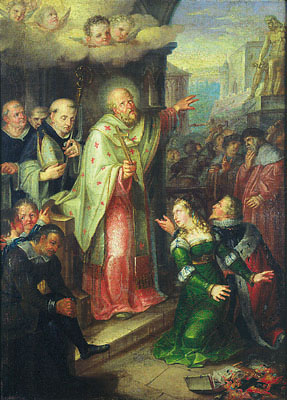
A multi lingual heir with ancestries from many nations, a law that gave stability to a nation in times of uncertainty and a resurgence of an empire and a nation.
Story in the evening ...
Story in the evening ...
https://twitter.com/Arby_K/status/1357516971365961734
Václav was born in 1316 to King Jean de Luxembourg of Bohemia and Eliska. He grew up in the French royal court while his father ruled from Prague in Bohemia. His mother was from the last legitimate generation of the Přemyslid dynasty that had ruled Bohemia from beginning. 1/10 

His stint in France gave Václav a new name - Karl, and a wife, Blanche de Valois, sister of the future French King Philippe VI. The influential Archbishop of Trier, Baudouin de Luxembourg, took interest in his great nephew's training. 2/10 

Baudouin had helped in the election of his brother, Henri de Luxembourg, Count of Luxembourg and Prince Karl's grandfather, as King of Germany in 1308 and Holy Roman Emperor in 1312. But Henri's death in 1313 and his son Jean's youth led to the election of a new King. 3/10 

Henri was the first Emperor to be crowned after 1220. After the "deposition" of Emperor Friedrich in 1245, many princes from across Europe had vied for the imperial title and the German crown. Prince Karl's father-in-law was one among them. 4/10 

After stints in Luxembourg and Lombardy, Karl was made Margrave of Moravia, a subsidiary title in Bohemia. He gained a reputation as a good administrator, causing a rift with his father. But as his father lost his eyesight, Karl regained his prominence. 5/10 

After Henri de Luxembourg's death in 1313, Ludwig von Bayern and Friedrich von Habsburg were elected as his successor by different sets of electors. Ludwig won the civil war that followed, but the papacy didn't get along with him. 6/10 

In 1342, Pierre Roger, a former tutor of Prince Karl, was elected as Pope (Clement VI). In 1346, Karl was elected as German King with the backing of the Pope. But Ludwig didn't approve. However, Ludwig's death the next year prevented another civil war. 7/10 

Jean de Luxembourg died in 1346 making Karl King of Bohemia. Though the Bavarian faction elected Günther von Schwarzburg as King, Karl would come out the victor. In 1355, Karl was crowned Emperor. The next year, he issued the Golden Bull. 8/10 

The Golden Bull gave the initial form of constitution for the Holy Roman Empire. It also defined the electors who would elect the Emperor - Bohemia, Palatinate, Saxony, Brandenburg and the Archbishops of Mainz, Cologne and Trier. 9/10 

For most of the next century, Karl's capital, Prague, would be the capital of the Empire, flourishing as a centre for arts and culture. But the Luxembourg dynasty would only last till 1437 and its possessions would fall into Habsburg hands. 10/10 

• • •
Missing some Tweet in this thread? You can try to
force a refresh














